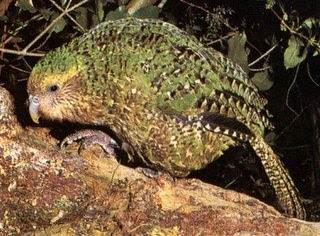A couple weeks ago, my philosophy teacher gave me an audio book by one his, and my, favorite authors, Douglas Adams, called Last Chance to See. Unlike everything else I've read by him, an author who usually writes witty science-fiction comedies (the most well known of this being The Hitchhiker's Guide to the Galaxy), this is a work of documentative and speculative non-fiction, and it's awesome.
Mark Carwardine, a "Zoologist...wildlife photographer, TV and radio presenter, writer, best-selling author and magazine columnist.", and the BBC asked Adams in 1985 if he would accompany them on an around-the-globe hunt to photograph and make a radio program about some of the world's endangered animals. Through the many adventures involving horrible flight attendants, vertigo, near drownings and getting lost in foggy, exotic forests at 5 am, Adams, Carwardine, and the rest of their BBC crew make their way from Madagascar to New Zealand, from Indonesia to Zaire, and from China to Rodrigues, meeting some of the world's most peculiar and interesting nearly extinct creatures there.
Last Chance to See mixes just the right amount of novel-esque narrative, in what reminds me of a quest story, where the main characters have to journey great distances with some sort of goal, only they have more condom-covered microphones and copious amounts of aftershave then your average hero (if that doesn't pique at least a little interest, I don't know what will). The funny incidents involving the residence of the various countries, be them humans or the animals, make you smile and chuckle aloud at points, heightened in my experience by the fact that it's a British guy speaking.
Despite the fact that there is a great deal of humour in it, there's several other elements he uses to keep interest. There's some suspense, since you never know if they'll actually see the rare creature they're looking for or not, and it also gets very philosophical at times, though not to the point where you're floundering in terms you don't understand. Rather, it's more of a reflection on our lives, humanity, the world, how we treat it, and so forth. Which relates to the last thing it does, which is the primary reason why it exists, which is bring awareness to these beautiful and strange fauna and flora that are rapidly disappearing off the face of the earth because of us. However, unlike a lot of environmentally-focused books, movies, or speeches, it's not very pushy, and doesn't suggest that you personally should take up the cause, fly to Zaire and protest against poaching. It just tries to draw attention to the cause that zoologists and naturalists are fighting for, not to call their cause pointless, and, if you feel the need, help in whatever way you want or can.
Here are a couple quotes to give you an idea of the content:
"I suddenly felt, well, terribly old as I watched a mudskipper hopping along
with what now seemed to me like a wonderful sense of hopeless, boundless
naive optimism. It had such a terribly, terribly, terribly long way to go. I
hoped that if its descendant was sitting here on this beach in 350 million
years' time with a camera around its neck, it would feel that the journey
had been worth it."
with what now seemed to me like a wonderful sense of hopeless, boundless
naive optimism. It had such a terribly, terribly, terribly long way to go. I
hoped that if its descendant was sitting here on this beach in 350 million
years' time with a camera around its neck, it would feel that the journey
had been worth it."
And:
' "You're proposing twenty hours on a boat-"
"A small boat," added Mark.
"On violently heaving seas-"
"Probably."
"With a three-day-old dead goat."
"Yes."
"I hardly know what to say." '
You sort of get the idea then.
Now, on their tour, they try to find several different types of animal, such as the Silverback Mountain Gorilla and the Aye-Aye (a type of Lemur), but my favorite animal that they search for, by far, is called the Kakapo.

 This is a Kakapo. There are less than 100 of these birds alive. However, that number is a great deal higher than what it was around twenty years ago, when the conservation efforts were started.
This is a Kakapo. There are less than 100 of these birds alive. However, that number is a great deal higher than what it was around twenty years ago, when the conservation efforts were started.Stephen Fry and the zoologist from the original actually went out and redid this program, but with film, and it was published this year. I imagine that's pretty good too, judging by this video.
Read this book, or listen to this program, or watch this show.
10/10.
10/10.

No comments:
Post a Comment